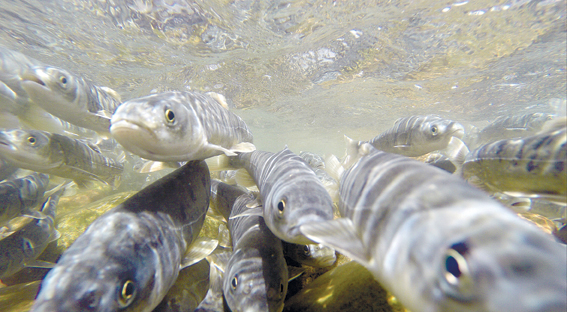Hydroelectric power stations affect fish migration
- By Jason Lee
 0 Comment(s)
0 Comment(s) Print
Print E-mail China.org.cn, April 20, 2016
E-mail China.org.cn, April 20, 2016
|
|
|
Fish migration [File photo] |
The amount of fish fries in the Yangtze River is less than one three-hundredth of what it was in the 1950s, and some rare fish are even dying out, according to the Chinese Academy of Sciences. The main reason is hydroelectric dams built upstream in the river's tributaries.
Upstream in the Daning River in southwest China's Chongqing, torrential torrents disappear, giving way to dry riverbed. The hydroelectric dam blocks not only water, but also migrating fish.
Chinese President Xi Jinping urged the governments along the Yangtze River to put ecological restoration at a top position on their to-do list early this year in a conference on building the Yangtze River Economic Belt.
Daning River originates at Dabashan Mountain in Chongqing. In the river's upstream section, a diversion was built for a hydroelectric power station. A diversion canal directly channels water from the river to a hydroelectric dam below. The amount of water flowing into the river sharply drops.
These kinds of hydroelectric stations are common in almost all the big tributaries of the Yangtze River. Yao Weizhi, a fishery researcher with Southwest University in Chongqing, said many kinds of fish would go to the upper reach of the river to spawn and then go to grow in the lower reach. But the dam blocks migration.
The other problem caused by the hydroelectric power station is a temperature drop in the river. Yao said the water temperature near the outlets in the Daning River is 10.2 degree centigrade, and the water temperature further from the hydroelectric station is 13.5 degree centigrade.
Yao said fish need proper temperature conditions to spawn. In low-temperature water, fish cannot lay eggs normally. The fish don't function normally in the new environment. For example, the river water rises in spring, and many fish tend to lay eggs in shallow-water parts. But for the purpose of flood prevention, the water in the reservoir is kept at a low level, causing the death of many fish eggs from dehydration.
Experts stress that the construction of hydroelectric stations must be prudent, given its potential impact on the environment. Hydroelectricity is clean energy. The government should keep a balance between ecological conservation and energy structural transformation.
On Xixi River, a tributary of the Daning River, three cascade hydropower stations were built, which are all diversion hydroelectric stations. According to regulations, these kinds of power stations should regularly discharge specific amounts of water into the natural downstream watercourses as an ecological compensation. However, Jiang Min, vice-manager of a hydroelectric station on the Xixi River, said that the hydroelectric station only discharges water occasionally to save on operating costs. "If we follow the environmental protection department's rules, we will lose more than 3 million kilowatts' electricity, about 1 million yuan."
Jiang said that 3 million kilowatts' power is a lot for his power station. He also said many smaller water power stations do not drain water at all. The poor supervision of ecological protection means that the environment often loses out to economic gains.
In the past decades of years, the Yangtze River and its tributaries, such as Jinsha River and Yalong River, have become important centers for hydroelectric power, transmitting hundreds of millions' kilowatts power to the eastern and central regions of China.
Experts have said that although ecological restoration needs large amounts of funding, more and more local governments in the middle and upper reach of the Yangtze River are starting to consider initiating the projects.
Fengjie County in Chongqing, home of the giant salamander, canceled construction of a hydroelectric station in 2013 and to set up a natural reserve to protect the giant salamander.
Liu Zhuming, a fishery administration official in Fengjie, said this decision is quite important to ecological protection. The losses incurred in the pursuit for temporary economic growth sometimes outweigh the gains.
Fishermen care about their futures on the Yangtze River, as wild fish become increasingly rare in China's largest river.
Zhu Dexing, a 64-year-old fisherman in Fengjie, said: "After fishing in the Yangtze River for more than 40 years, I've seen the fish become fewer and fewer. I wholeheartedly support the ecological protection of the river."






